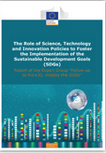The European Commission (EC) released a report on the role of science, technology and innovation (STI) in implementing the Sustainable Development Goals (SDGs), presenting the conclusions of an independent expert group on the follow-up to the UN Conference on Sustainable Development (UNCSD, or Rio+20).The report elaborates a "reference framework" utilizing research and innovation policy and related implementation measures as "engines of a transformative agenda built around universally applicable sustainability goals.”
 16 November 2015: The European Commission (EC) released a report on the role of science, technology and innovation (STI) in implementing the Sustainable Development Goals (SDGs), presenting the conclusions of an independent expert group on the follow-up to the UN Conference on Sustainable Development (UNCSD, or Rio+20). The report elaborates a “reference framework” using research and innovation policy and related implementation measures as “engines of a transformative agenda built around universally applicable sustainability goals.”
16 November 2015: The European Commission (EC) released a report on the role of science, technology and innovation (STI) in implementing the Sustainable Development Goals (SDGs), presenting the conclusions of an independent expert group on the follow-up to the UN Conference on Sustainable Development (UNCSD, or Rio+20). The report elaborates a “reference framework” using research and innovation policy and related implementation measures as “engines of a transformative agenda built around universally applicable sustainability goals.”
The EC established the Expert Group on ‘Follow-up to Rio+20, notably the SDGs’ in March 2015, under Horizon 2020, the EU Framework Programme for Research and Innovation, to provide advice to the EC.
The report considers the possible impact of the 2030 Agenda for Sustainable Development on EU policies. It finds that the pursuit of the SDGs offers the EU an opportunity to turn its commitment to sustainable development into concrete actions, including through the EU’s Circular Economy package, the Innovation Union, the Energy Union, the Digital Single Market and at the Paris Climate Change Conference. It recommends that the First Vice-President for Sustainable Development engage all relevant EC Directorate-Generals (DGs) in the integration of the 2030 Agenda in the forthcoming review of the EU 2020 Strategy. The report also discusses the role of investments for changing current economic and social paradigms, and making practices sustainable.
The report recommends three key avenues for aligning the 2030 Agenda with the EU’s policies on STI and sustainable developmens. First, it calls for “switching the focus” to reorient mindsets and behaviors toward sustainable development, reframe the EU’s STI challenges and shift from a focus on technology transfer to building innovation capacity. Second, the report recommends strengthening partnerships and enhancing engagement with developing countries and all stakeholders, including the private sector, to develop tailor-made international STI initiatives. Finally, it recommends “walking the talk” by addressing the causes of implementation gaps, improving policy coherence, ensuring domestic integration of the SDGs with/in STI, building opportunities to benefit from a data revolution, and monitoring and evaluating STI for sustainable development.
The report includes over 50 specific recommendations, aiming to stimulate internal reflection in Europe and the EC on how to orient STI policies for SDG implementation. An Annex includes proposals for aligning the Horizon 2020 tracking system with the SDGs.
The EC presented a draft version of the report at the Third International Conference on Financing for Development (FfD3), in July 2015, in Addis Ababa, Ethiopia. [Publication: The role of science, technology and innovation policies to foster the implementation of the Sustainable Development Goals (SDGs)] [Horizon 2020 Website]